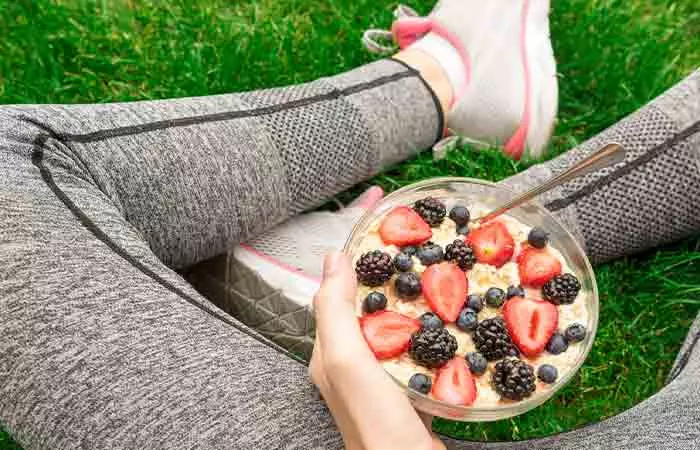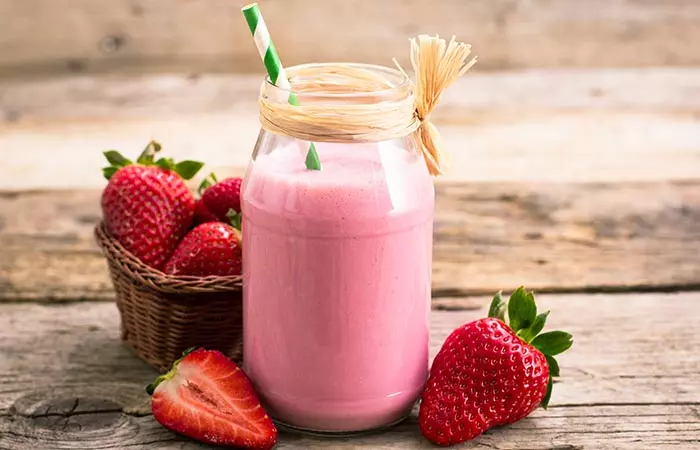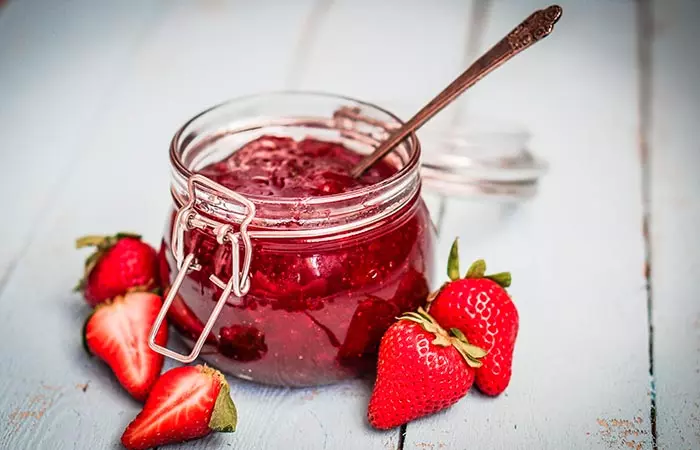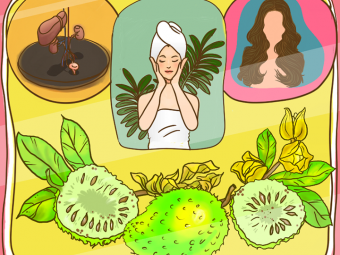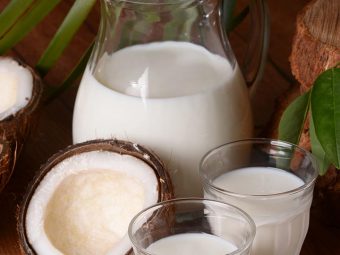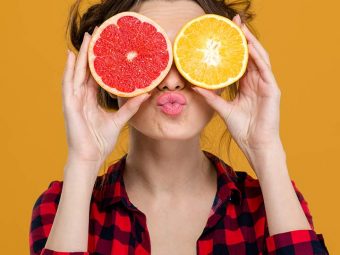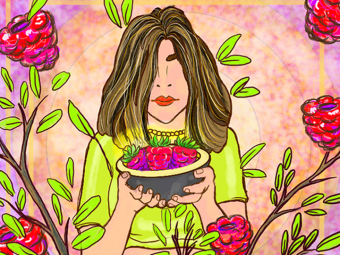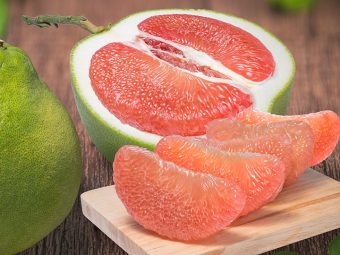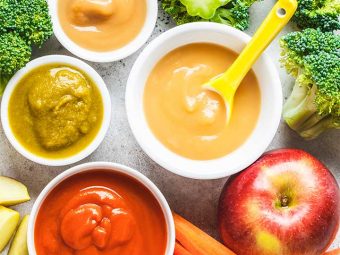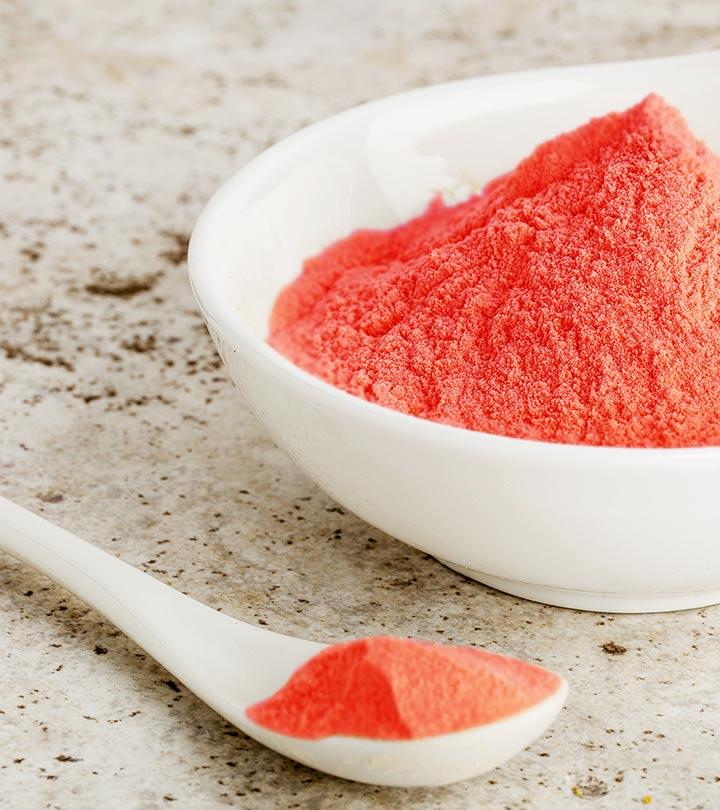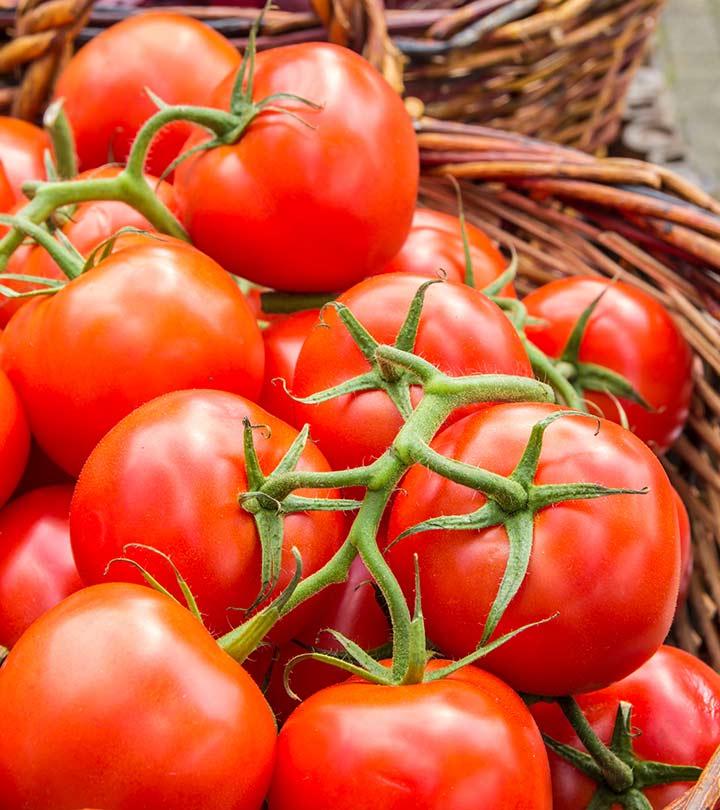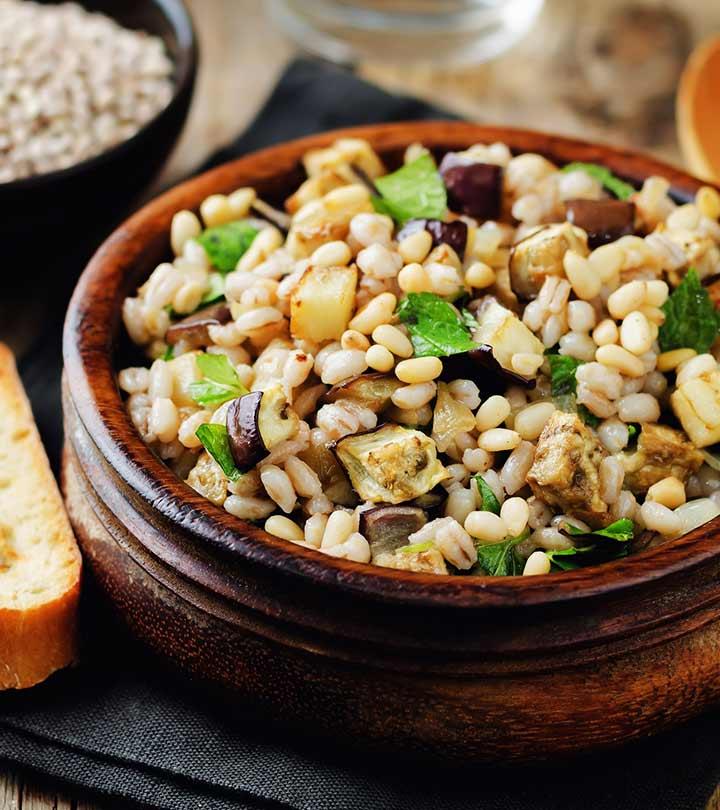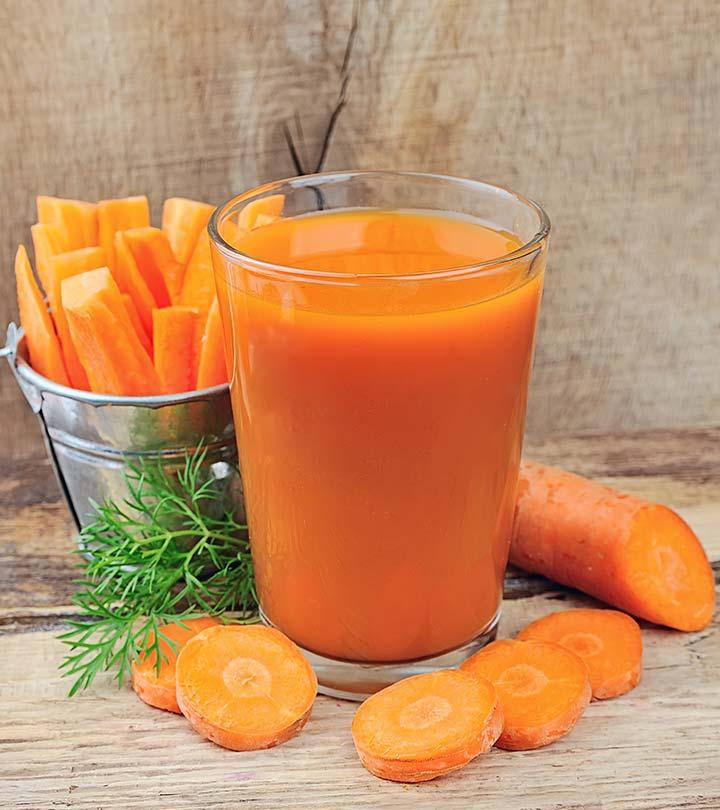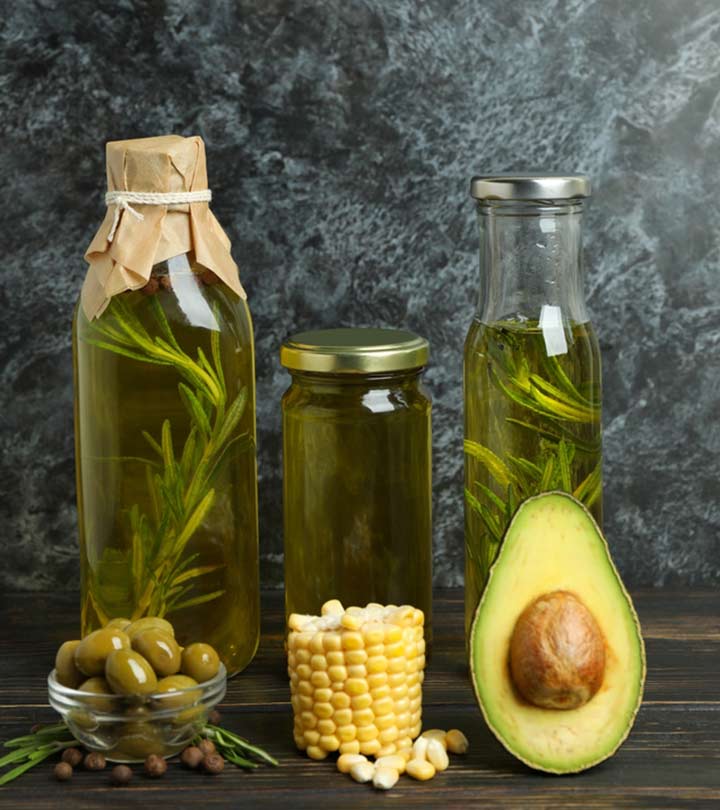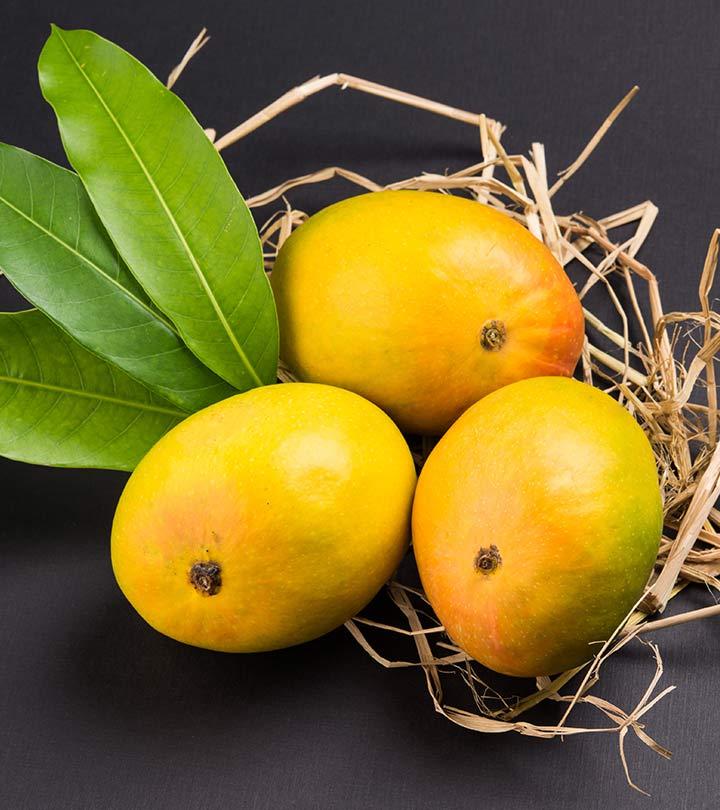16 Strawberries Benefits, Nutrition, Recipe And Side Effects
This juicy fruit can enhance your desserts as well as your overall health!
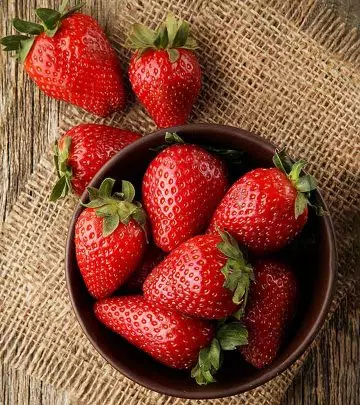
Image: Shutterstock
The benefits of strawberries (believed to be native to France) are plenty. They are a good source of antioxidants and nutrients that help manage blood sugar levels and improve heart health.
The strawberry fruit is a particularly good source of minerals like manganese and potassium, as well as vitamin C.
These red, juicy, sweetish fruits are perfect for making jams, desserts, jellies, and many other dishes.
In this article, we look at the 16 amazing benefits of strawberry, its nutritional profile, potential side effects, and tips to include it in your diet. Keep reading!
 Know Your Ingredient: Strawberry
Know Your Ingredient: StrawberryWhat Is It?
Fruit from the genus Fragaria known for its bright red color, juicy texture, and sweetness.
What Are Its Benefits?
It is rich in vitamin C which helps improve skin and hair health and enhances immunity.
Who Can Consume It?
Anyone can take it except for people on blood clotting medication.
How Often?
It can be consumed daily in moderation.
Caution
Pregnant or breastfeeding women should avoid consuming it.
In This Article
What Do Strawberries Symbolize?
Strawberries have different symbolic meanings across several cultures. We have covered a few below.
- Strawberries are the symbol of Venus, the Roman Goddess of love, due to their color and shape.
- Strawberries are believed to bring good fortune due to their bright red color.
- They are believed to be a symbol of rebirth and new beginnings.
- Both fresh and dried strawberries are given on wedding nights in Japan and China as a symbol of fertility and love.
Apart from being symbols of passion and fertility, strawberries are rich in therapeutic properties and can help improve one’s health and well-being. Find out more in the next section.
What Are The Health Benefits Of Strawberries?
Are strawberries good for you? The antioxidants and polyphenols in the strawberry fruit benefit heart health and prevent various forms of cancer. And so does the vitamin C these berries contain, which also contributes to skin and hair health. The fiber in the strawberry benefits digestion and helps in weight loss.
1. May Protect The Heart
One of the benefits of eating strawberries is improved heart health. The abundance of antioxidants and polyphenols in strawberries makes them the ideal food to protect your heart from ailments. Strawberries contain anthocyanins (the antioxidants responsible for their red hue), which protect the lining of the circulatory system, thereby shielding the arteries from plaque build-up and regulating the blood pressure (1).
According to Dr. Suzanne Steinbaum, a cardiologist at Lenox Hill Hospital, New York City, women who consumed three or more servings of berries (especially strawberries) every week had reduced their risk of heart attack by a third.
2. May Regulate Blood Sugar Levels
Strawberries also contain ellagic acid, and this, along with the antioxidants, helps in slowing down the digestion of starchy foods. This controls the rise in blood sugar levels post a starchy meal. The benefits of strawberry include helping individuals with type-2 diabetes keep their blood sugar levels in check (2).
Strawberries also have a low glycemic index (40), which means they are unlikely to cause sharp sugar spikes when eaten by diabetics.
The fiber in strawberries can also help regulate blood sugar levels.
3. May Help Fight Cancer
Strawberries are exceptionally good sources of vitamin C and fiber, both of which have been found to protect from cancers of the esophagus and colon. The anticancer properties of strawberries, according to the American Institute for Cancer Research, can be attributed to the presence of ellagic acid – a phytochemical that can prevent cancers of the skin, lung, bladder, and breast (3).
Ellagic acid acts as an anticancer agent in several ways – it acts as an antioxidant, slows down the production of cancer cells, and helps the body destroy certain types of carcinogens.
4. May Boost Immunity
Strawberries are excellent sources of vitamin C. In fact, a single serving of strawberries has more vitamin C than an orange. Vitamin C has been found to trigger immune-boosting antibodies, which ultimately enhance your body’s ability to fight infections (4).
In one study conducted in Switzerland, it had been found that supplementation of vitamin C had improved the various components of the immune system (5).
According to research conducted by South African doctors, supplementation of vitamin C increased the concentration of immunoglobulin, which is an antibody and a key component of the immune system (6). Strawberries are also known to fight allergies and asthma.
5. May Regulate Blood Pressure
As already mentioned, strawberries contain anthocyanins, which are powerful antioxidants that relax the lining of the blood vessels and open them up, thereby lowering blood pressure (1).
Strawberries are also rich in potassium, a nutrient that helps control blood pressure (7).
6. May Improve Brain Health
The credit goes to the antioxidants, again. Strawberries, with their high content of antioxidants, protect the brain cells from damage due to free radicals. They also change the way the neurons in the brain communicate with each other (8). This ultimately leads to improved brain health.
A study conducted by Harvard researchers at Brigham and Women’s Hospital has revealed that the intake of strawberries can delay memory decline in older women over time (9). This benefit can be attributed to the presence of flavonoids in strawberries. Also, it was found that an increased intake of anthocyanidins helped in slowing down memory decline.
According to the studies conducted by researchers from Tufts University and the University of Maryland Baltimore County, a majority of brain diseases (including Alzheimer’s and Parkinson’s) are caused due to an increase in the amount of a particular toxic protein. But the consumption of strawberries has been found to promote the brain’s natural housekeeping mechanism (also called autophagy), thereby reducing the accumulation of this protein (10).
7. May Fight Inflammation
Strawberries contain quercetin, and according to a study conducted by the University of Massachusetts, intake of quercetin, along with regular exercise, can reduce atherosclerotic plaque formationi XThe formation of fatty substances on and in the walls of the arteries that causes them to harden and curb blood flow. (11).
Strawberries are also rich in vitamin C, which plays a major role in preventing inflammation (12). This vitamin also plays a role in easing the symptoms of arthritis and gouti XA type of arthritis that causes severe pain, inflammation, and swelling in more than one joint, mainly around the big toes of the feet. .
It has been found that high levels of C-reactive protein (or CRP) can signal increasing levels of inflammation in the body. According to researchers from the Harvard School of Public Health, women who consumed 16 or more strawberries every week were 14 percent less likely to have elevated levels of this protein (13).
8. May Fight Cholesterol
Strawberries are known to contain pectin, which is a type of soluble fiber that lowers the levels of LDL (bad cholesterol) in the body (14).
According to a New Orleans study, several types of soluble fiber, including pectin, have shown to lower the levels of LDL (15).
As per an analysis carried out together by Italian and Spanish scientists, the consumption of 500 grams of strawberries regularly for a month saw a decrease in the LDL levels (16).
Another Canadian study showed the efficacy of strawberries in reducing oxidative damage and bad cholesterol (17).
9. May Improve Vision Health
Strawberries are loaded with antioxidants that were found to prevent cataract, macular degenerationi XAge-related breakdown of the macula, a part of the retina in our eye that assists in having a clear central vision. , and other eye diseases (18).
10. May Aid Weight Loss
The ellagic acid and antioxidants are what play a major role in making strawberries ideal for weight management (19).
Chronic inflammation is one of the causes of weight gain since it blocks the hormones that make you lean. Strawberry, being an amazing anti-inflammatory food, restores the functionalities of weight-reducing hormones (20).
In addition, anthocyanins, the master antioxidants, increase the body’s production of a hormone called adiponectin (21). This hormone promotes metabolism and suppresses your appetite. It might also induce fat burn.
11. May Support Healthy Pregnancy
Strawberries are a rich source of folate (22). You get about 40 micrograms of folate from one cup of raw strawberries. This is about 10% of the recommended daily intake. According to research, folate is important during pregnancy as it can prevent neural tube defects. It is also important for the mother’s health (23).
12. May Keep Teeth Healthy
Strawberries contain malic acid, which acts as an astringenti XAny lotion or substance is known to help tighten the skin and reduce oiliness. and removes tooth discoloration. This means you can use this fruit to whiten your teeth. You simply can crush the strawberry to a pulp and mix with baking soda until you obtain a smooth blend (24). Using a soft toothbrush, spread the mixture on your teeth. Leave it on for 5 minutes, brush thoroughly with toothpaste, and rinse.
However, don’t overdo it as the acid in the fruit might damage your enamel.
13. May Have Anti-Aging Properties
The powerful antioxidants need to be given credit, again! A few strawberry benefits for the skin include protection from oxidative damage and stalling the signs of aging (wrinkles, sagging skin, fine lines, etc.) (25).
They are also great sources of lycopene, an antioxidant that plays a prominent role in staving off the signs of aging. The anthocyanins present in strawberries protect the skin from oxidative stress, thereby slowing down aging (26).
14. May Improve Skin Health
Berries usually contain alpha-hydroxy acid, which is an important substance that helps eliminate dead skin cells and cleanses the skin in the process (27).
According to a study conducted by Hahnemann University School of Medicine, Pennsylvania, treatments with alpha-hydroxy acids have been found to reverse signs of aging (28).
The strawberry fruit also contains salicylic acid and ellagic acid, which are known for reducing hyperpigmentation and dark spots (29). Salicylic acid is also known for removing dead cells from the skin and tightening the skin pores to prevent further acne breakouts (30).
Strawberries are also an excellent source of vitamin C, which can cleanse the skin and keep it healthy. The berries have other skin benefits too – they improve your complexion, tone and soothe irritated skin, and offer protection from UV radiation.
You can simply mix strawberry paste with some honey and apply it to your face every morning. Leave the mask on for 15 minutes and wash with cold water. You can replace honey with rose water as well. Or even add milk to the recipe. All these ingredients work wonders in improving skin health.
15. May Prevent Hair Fall
As already discussed, strawberries are great sources of vitamin C – a nutrient that encourages iron absorption and promotes hair growth. It has also been found that a deficiency of this nutrient can lead to split ends (31). The vitamin can also treat dandruff.
It is also believed that the silica in strawberries may slow down baldness and boost hair growth. However, there is no scientific evidence to back this claim.
You can prepare a strawberry hair mask that can help you deal with your hair problems. Mix strawberry paste (2 berries) with extra virgin coconut oil and honey (1 tablespoon each). Apply to your scalp and leave it on for 20 minutes, post which you can wash your hair with cold water. This must be done on a clean scalp, usually in the mornings after your bath. This mask also prevents scalp fungal growth – the magnesium in the berries takes care of this problem.
16. May Have Benefits For Men
The antioxidants in strawberries benefit your heart and arteries – both of which enhance circulation, which is crucial for healthy sex life. The vitamin C in the berries also results in higher sperm count in men (32).
 Trivia
TriviaThat’s the long list of strawberry fruit benefits. Simply incredible, aren’t they? But, how can you use these wonder berries in your cooking? Well, we have the answers.
Strawberry Nutrition Facts
| Vitamins | ||
|---|---|---|
| Amount | %DV | |
| Vitamin A | 1 µg | 0% |
| Vitamin C | 58.8 mg | 65% |
| Vitamin D | 0 µg | ~ |
| Vitamin E | 0.29 mg | 2% |
| Vitamin K | 2.2 µg | 2% |
| Vitamin B1 (Thiamine) | 0.02 mg | 2% |
| Vitamin B2 (Riboflavin) | 0.02 mg | 2% |
| Vitamin B3 (Niacin) | 0.39 mg | 2% |
| Vitamin B5 (Panthothenic acid) | 0.13 mg | 3% |
| Vitamin B6 (Pyridoxine) | 0.05 mg | 4% |
| Vitamin B12 | 0 µg | ~ |
| Folate | 24 µg | 6% |
| Choline | 5.7 mg | 1% |
| Minerals | ||
|---|---|---|
| Amount | %DV | |
| Calcium | 16 mg | 2% |
| Iron | 0.41 mg | 5% |
| Magnesium | 13 mg | 3% |
| Phosphorus | 24 mg | 3% |
| Potassium | 153 mg | 3% |
| Sodium | 1 mg | 0% |
| Zinc | 0.14 mg | 1% |
| Copper | 0.05 mg | 5% |
| Manganese | 0.39 mg | 17% |
| Selenium | 0.4 µg | 1% |
Source: USDA
Calories in strawberries – One cup of fresh strawberries (152 grams) contains 49 calories.
Carbs in strawberry – 7 grams of carbohydrates are present in a cup of strawberries.
Fat in strawberry – Strawberries contain no fat.
Strawberry fiber – 3 grams of fiber is present in a cup of strawberries.
Other nutrients in strawberries include:
- 1 gram of protein (2% of the daily value)
- 4 milligrams of vitamin C (149% of the daily value)
- 6 milligrams of manganese (29% of the daily value)
- 5 micrograms of folate (9% of the daily value)
- 233 milligrams of potassium (7% of the daily value)
- 8 milligrams of magnesium (5% of the daily value)
- 3 micrograms of vitamin K (4% of the daily value)
Strawberries are a good source of vitamins, nutrients and antioxidants that offer many health benefits. As a result, their consumption has also increased over the years. The per capita consumption of fresh strawberries has increased significantly from 2000 to 2020 in the United States, peaking at 8.5 lbs in 2020. Check out the chart below for detailed info on the per capita consumption of fresh strawberries from 2000-2020.
Per Capita Consumption Of Fresh Strawberries In The US (2000-2020)
Source: Statista Trivia
TriviaThere are numerous other nutrients in strawberries that offer wonderful benefits. But how can you include these wonder berries in your diet? Well, we have the answers.
Any Tips For Including Strawberries In Your Diet?
Strawberries are most commonly used in desserts and ice creams. Their extracts are also used as preservatives in a variety of products. Due to their sweet and juicy flavor, they can also be eaten whole like other fruits. Today, they form a part of various recipes. Given below are some tips for enjoying this delicious fruit.
- You can simply eat the strawberries raw. Before doing so, wash them in running water and wipe them with paper towels until they are completely dry. Holding the strawberry by the stem, take a few bites. Even the seeds are edible.
- Strawberry slices can be added to a mixed green salad to make it yummier.
- Strawberry mousse is one of our favorites. It is quite delicious and can be eaten as it is or served as a topping over other desserts.
- Sliced strawberries, whole blueberries, and plain yogurt can be arranged in layers in a wine glass to make a parfait dessert.
- Strawberries can be blended with orange juice to make the perfect coulis sauce. This fruit can also be added to breakfast shakes to make them more vibrant and nutritious.
- Strawberry pie can be prepared by piling the whole fruits on a layer of creamy filling.
- Strawberries are not just perfect for desserts – they can be used in the main dish as well. A chicken and strawberry salad is a perfect example that combines the amazing flavors of sweet strawberries, tangy vinaigrette, chicken, and rich blue cheese.
- Pizzas can also be topped with strawberries. You can layer your favorite pizza with strawberry slices along with soft cheese or greens and pistachios.
- The strawberry-avocado salsa is an extremely sweet and savory dish that can be served with roasted chicken or sautéed fish or eaten as a snack with baked tortilla chips.
- Strawberries can add flavor to your tea as well. All you need to do is add some tea and a cup of strawberries to boiling water. Cover and let it stand for 5 minutes. Strain the tea and add ice cubes and sugar. This refreshing drink can be garnished with strawberries and served chilled.
 Trivia
TriviaThat’s not all. In the following section, we have a couple of delicious strawberry recipes!
Any Strawberry Recipes You Can Look At?
1. Strawberry Smoothie
What You Need
- 8 hulled strawberries
- ½ cup of skim milk
- ½ cup of plain yogurt
- 1 teaspoon of honey
- 2 teaspoons of vanilla extract
- 6 crushed ice cubes
Directions
- In a blender, add all the ingredients (except the ice) and blend until you obtain a smooth mixture.
- Toss in the ice and blend again.
- Pour into glasses and serve.
Here are five other ways you can prepare this delicious strawberry smoothie. This video will guide you.
2. Strawberry Jam
What You Need
- 2 pounds of fresh hulled strawberries
- 4 cups of white sugar
- ¼ cup of lemon juice
Directions
- Crush all the strawberries until you have 4 cups of mashed strawberry.
- Take a heavy-bottomed saucepan, and mix the mashed strawberry, sugar, and lemon juice. Stir over low heat until the sugar dissolves.
- Increase the heat and bring the mixture to a rolling boil. Keep stirring often.
- Transfer the mixture to hot sterile jars, leaving about an inch of headspace. Seal. Process the jars in a water bath.
- Refrigerate.
The recipes are bound to become a hit at your home. And so are these fun facts about strawberries.
What Are The Side Effects Of Strawberries?
- Issues With Pregnancy And Breastfeeding
Though taking the fruit in normal amounts is safe during pregnancy and breastfeeding, not enough research has been conducted to know what will happen if it is taken in excess. Stick to normal food amounts.
- Bleeding Disorders
Strawberries might prolong bleeding time and even increase the risk of bruising in susceptible individuals. Use with caution if you have bleeding disorders. Also, take care if you are undergoing surgery as strawberries might slow blood clotting. Avoid use at least 2 weeks before a scheduled surgery. Keep in mind that research is limited in this area.
Infographic: Some Facts About Strawberries
Apart from the several benefits of strawberries and their nutritional value, there are a few facts about this fruit that are not well-known. Though it is called a berry, it is not actually a berry but a fruit belonging to the rose family. It is a popular fruit that is found in almost all American households, and it is estimated that the average American consumes around 3.5 lbs of strawberries per year.
Check out the infographic below to learn more facts about strawberries. Illustration: StyleCraze Design Team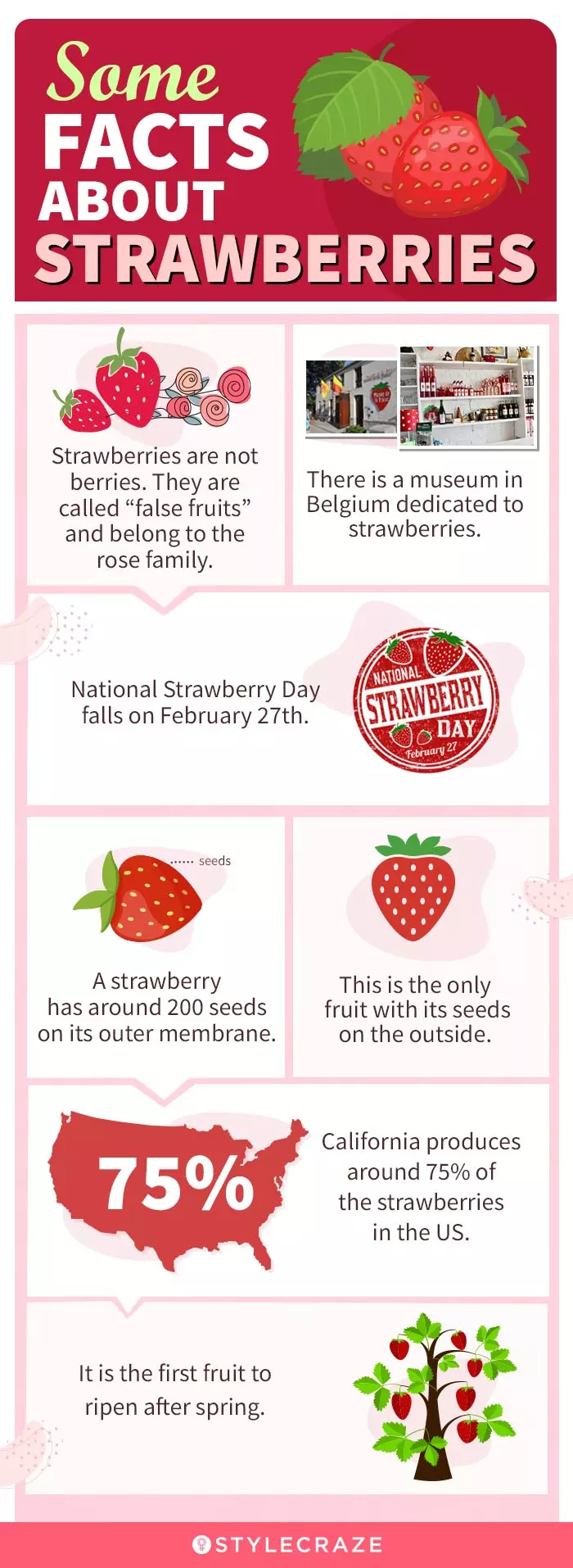
Strawberries are sweet, juicy fruits rich in antioxidants and plant compounds. These delicious berries are high in nutrients and can be consumed raw or fresh. The many strawberry health benefits can be attributed to their rich nutritional profile. The consumption of strawberries may protect the heart, aid in blood sugar control, support cancer prevention, boost immune health, regulate blood pressure levels, and improve brain function. They can also improve skin health by eliminating dead skin cells and cleansing the skin. Though there is not enough research on the side effects of strawberries, pregnant and breastfeeding women should check their portions to avoid adverse reactions.
Frequently Asked Questions
How much sugar in strawberries?
One small strawberry contains just about 0.3 grams of sugar.
Can you give strawberries to babies?
Only after he/she starts taking solid food – which usually happens when the baby is about 6 months old.
How to make strawberry tea?
Simply steep some strawberries in boiling water. Drain and drink.
Can you eat the leaves of strawberries?
Yes, very much.
Are strawberries fattening at night?
No. The fiber in the fruits helps in digestion and even can aid fat burning.
What is strawberry tongue?
Red color changes on the tongue that could otherwise be related to an underlying condition is called strawberry tongue.
How many strawberries should you eat in a day?
Eight strawberries a day may improve heart health and reduce the risk of some cancers.
Are strawberries good for belly fat?
Yes, strawberries are good for reducing belly fat. They are rich in fiber, which curbs hunger and improves digestive function.
Are strawberries good for breakfast?
Yes, strawberries are good for breakfast because they are rich in fiber and low in calories.
Are strawberries good for bone health?
Though there is not much research on this, the vitamin K, potassium, and manganese in strawberries are said to improve bone health.
Do strawberries help in treating constipation?
Given that strawberries are rich in fiber, they can help treat constipation. The fiber in the fruit can also relieve other digestive issues like gas and bloating.
Can strawberries treat puffy eyes?
Strawberries contain amazing astringent properties that help treat puffy eyes and support eye health. They also contain alpha hydroxy acid, which makes the skin look smooth and young. Refrigerate a couple of strawberries for about 30 minutes. After that, remove their tops and cut them into thick slices. Place the slices over your face and leave them on for about 15 minutes. Remove them and wash your face with cold water. You can do this every night before going to bed.
Does strawberry make you sleepy?
Possibly. Strawberries are naturally rich in melatonin that may induce sleep (33). However, this also may depend on the number of strawberries one consumes.
Key Takeaways
- Strawberries may help regulate blood pressure, aid weight loss, and boost immunity.
- The AHAs and vitamin C in strawberries help soothe skin irritation and protect it from UV rays
- Avoid consuming strawberries If you have a bleeding disorder as it prolongs bleeding time.
- You can consume raw strawberries, add them to green salads, or blend them into healthy smoothies.
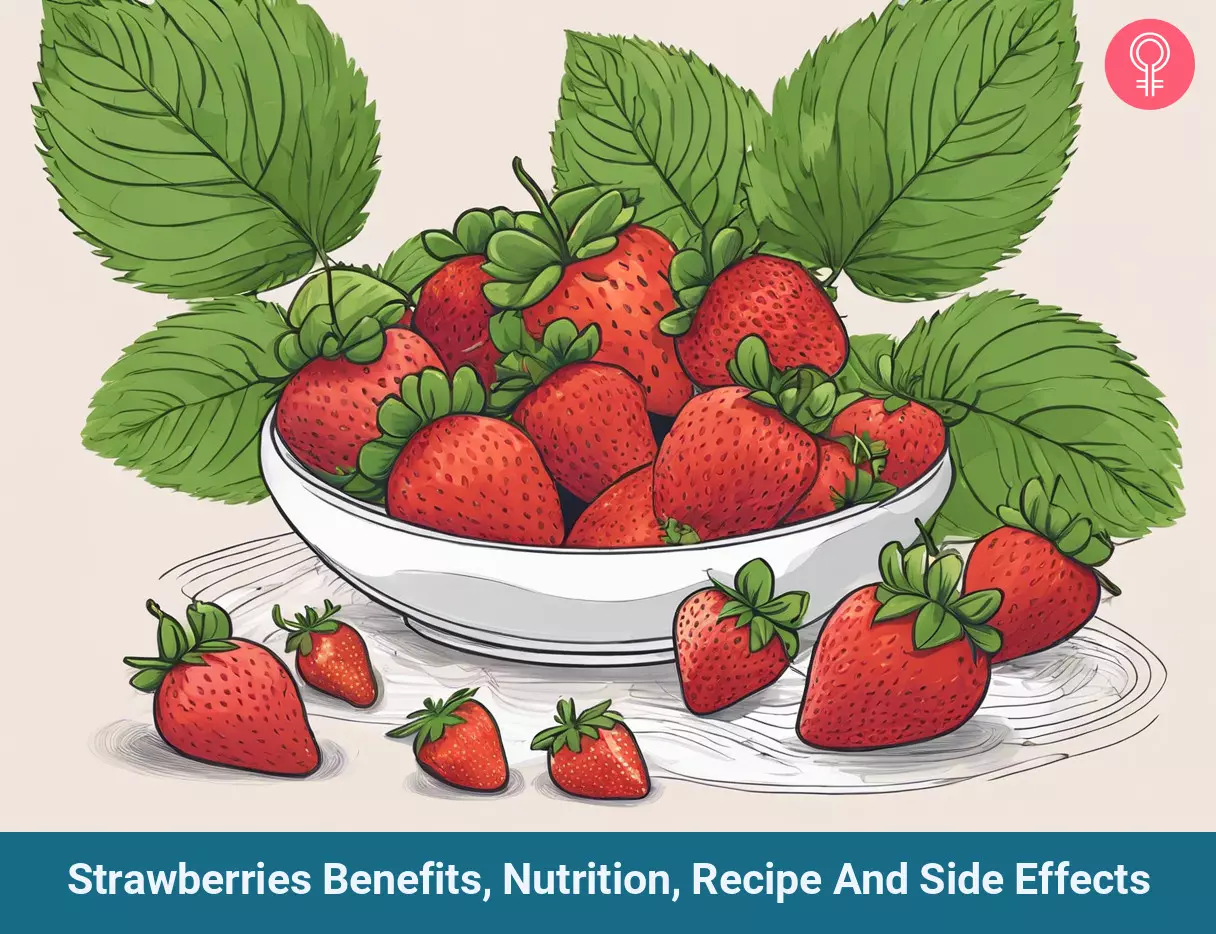
Image: Stable Diffusion/StyleCraze Design Team
Strawberries are packed with vitamins and minerals and offer many health benefits. Check out this video and learn about five of them!
References
Articles on StyleCraze are backed by verified information from peer-reviewed and academic research papers, reputed organizations, research institutions, and medical associations to ensure accuracy and relevance. Read our editorial policy to learn more.
- Anthocyanins in Cardiovascular Disease, Advances in Nutrition, US National Library of Medicine, National Institutes of Health.
https://www.ncbi.nlm.nih.gov/pmc/articles/PMC3042791/ - Long-term effects of low glycemic index/load vs. high glycemic index/load diets on parameters of obesity and obesity-associated risks: a systematic review and meta-analysis, Nutrition, Metabolism, and Cardiovascular diseases, US National Library of Medicine, National Institutes of Health.
https://www.ncbi.nlm.nih.gov/pubmed/23786819 - Foods That Fight Cancer?, American Institute for Cancer Research.
https://www.aicr.org/cancer-prevention/food-facts/berries?referrer=https://www.google.co.in/ - Vitamin C and Immune Function, Nutrients, US National Library of Medicine, National Institutes of Health.
https://www.ncbi.nlm.nih.gov/pubmed/29099763 - Immune-enhancing role of vitamin C and zinc and effect on clinical conditions, Annals of Nutrition and Metabolism, US National Library of Medicine, National Institutes of Health.
https://www.ncbi.nlm.nih.gov/pubmed/16373990 - Vitamin C and Immune System, The Linus Pauling Papers, US National Library of Medicine.
https://profiles.nlm.nih.gov/spotlight/mm/catalog/nlm:nlmuid-101584639X280-doc - The importance of potassium in managing hypertension, Current Hypertension Reports, US National Library of Medicine, National Institutes of Health.
https://www.ncbi.nlm.nih.gov/pubmed/21403995 - Effects of a mixed berry beverage on cognitive functions and cardiometabolic risk markers; A randomized cross-over study in healthy older adults, A Peer Reviewed, Open Access Journal (PLOS), US National Library of Medicine, National Institutes of Health.
https://www.ncbi.nlm.nih.gov/pmc/articles/PMC5687726/ - Dietary intakes of berries and flavonoids in relation to cognitive decline, Annals of Neurology.
https://onlinelibrary.wiley.com/doi/abs/10.1002/ana.23594 - with Beneficial effects of fruit extracts on neuronal function and behavior in a rodent model of accelerated aging, Neurobiology of Aging, ScienceDirect
https://www.sciencedirect.com/science/article/abs/pii/S0197458006001928 - Quercetin intake with exercise modulates lipoprotein metabolism and reduces atherosclerosis plaque formation, Journal of International Society of Sports Nutrition, US National Library of Medicine, National Institutes of Health.
https://www.ncbi.nlm.nih.gov/pubmed/24890098 - Vitamin C, National Institutes of Health.
https://ods.od.nih.gov/factsheets/VitaminC-HealthProfessional/ - Best Fruits for Arthritis, Arthritis Foundation.
https://www.arthritis.org/health-wellness/healthy-living/nutrition/healthy-eating/best-fruits-for-arthritis - Cholesterol-lowering properties of different pectin types in mildly hyper-cholesterolemic men and women, European Journal of Clinical Nutrition, US National Library of Medicine, National Institutes of Health.
https://www.ncbi.nlm.nih.gov/pubmed/22190137 - Effects of soluble dietary fiber on low-density lipoprotein cholesterol and coronary heart reports, US National Library of Medicine, National Institutes of Health.
https://www.ncbi.nlm.nih.gov/pubmed/18937894 - One-month strawberry-rich anthocyanin supplementation ameliorates cardiovascular risk, oxidative stress markers and platelet activation in humans, The Journal of Nutritional Biochemistry, US National Library of Medicine, National Institutes of Health.
https://www.ncbi.nlm.nih.gov/pubmed/24406274 - The effect of strawberries in a cholesterol-lowering dietary portfolio, Metabolism: Clinical and Experimental, US National Library of Medicine, National Institutes of Health.
https://www.ncbi.nlm.nih.gov/pubmed/19013285 - Nutrients for the aging eye, Clinical Interventions in Ageing, US National Library of Medicine, National Institutes of Health.
https://www.ncbi.nlm.nih.gov/pmc/articles/PMC3693724/ - Effects of Dietary Strawberry Supplementation on Antioxidant Biomarkers in Obese Adults with Above Optimal Serum Lipids, Journal of Nutrition and Metabolism, US National Library of Medicine, National Institutes of Health.
https://www.ncbi.nlm.nih.gov/pmc/articles/PMC4939384/ - Changes in Intake of Fruits and Vegetables and Weight Change in United States Men and Women Followed for Up to 24 Years: Analysis from Three Prospective Cohort Studies, PLOS, US National Library of Medicine, National Institutes of Health.
https://www.ncbi.nlm.nih.gov/pmc/articles/PMC4578962/ - Weight-Loss Diets, Adiponectin, and Changes in Cardiometabolic Risk in the 2-Year POUNDS Lost Trial, The Journal of Clinical Endocrinology and Metabolism, US National Library of Medicine, National Institutes of Health.
https://www.ncbi.nlm.nih.gov/pmc/articles/PMC4891796/ - Folate content in different strawberry genotypes and folate status in healthy subjects after strawberry consumption, BioFactors, US National Library of Medicine, National Institutes of Health.
https://www.ncbi.nlm.nih.gov/pubmed/19706971 - Folate and neural tube defects, The American Journal of Clinical Nutrition, US National Library of Medicine, National Institutes of Health.
https://www.ncbi.nlm.nih.gov/pubmed/17209211 - Efficacy of do-it-yourself whitening as compared to conventional tooth whitening modalities: an in vitro study, Operative Dentistry, US National Library of Medicine, National Institutes of Health.
https://www.ncbi.nlm.nih.gov/pubmed/25279797 - Strawberry consumption improves aging-associated impairments, mitochondrial biogenesis and functionality through the AMP-activated protein kinase signaling cascade, Food Chemistry, US National Library of Medicine, National Institutes of Health.
https://www.ncbi.nlm.nih.gov/pubmed/28551262 - An anthocyanin-rich strawberry extract protects against oxidative stress damage and improves mitochondrial functionality in human dermal fibroblasts exposed to an oxidizing agent, Food & Function, US National Library of Medicine, National Institutes of Health.
https://www.ncbi.nlm.nih.gov/pubmed/24956972 - Dual Effects of Alpha-Hydroxy Acids on the Skin, Molecules, US National Library of Medicine, National Institutes of Health.
https://www.ncbi.nlm.nih.gov/pmc/articles/PMC6017965/ - Effects of alpha-hydroxy acids on photoaged skin: a pilot clinical, histologic, and ultrastructural study, Journal of the American Academy of Dermatology, US National Library of Medicine, National Institutes of Health.
https://www.ncbi.nlm.nih.gov/pubmed/8642081 - Salicylic acid as a peeling agent: a comprehensive review, Clinical, Cosmetic and Investigational Dermatology, US National Library of Medicine, National Institutes of Health.
https://www.ncbi.nlm.nih.gov/pmc/articles/PMC4554394/ - Over-the-counter Acne Treatments, The Journal of Clinical and Aesthetic Dermatology, US National Library of Medicine, National Institutes of Health.
https://www.ncbi.nlm.nih.gov/pmc/articles/PMC3366450/ - Nutrition of women with hair loss problem during the period of menopause, Menopause Review, US National Library of Medicine, National Institutes of Health.
https://www.ncbi.nlm.nih.gov/pmc/articles/PMC4828511/ - Intake of Fruits and Vegetables with Low-to-Moderate Pesticide Residues Is Positively Associated with Semen-Quality Parameters among Young Healthy Men, The Journal Of Nutrition, US National Library of Medicine, National Institutes of Health.
https://www.ncbi.nlm.nih.gov/pmc/articles/PMC4841922/ - Determination of the melatonin content of different varieties of tomatoes (Lycopersicon esculentum) and strawberries (Fragariaananassa), US National Library of Medicine, National Institutes of Health.
https://pubmed.ncbi.nlm.nih.gov/25214134/






